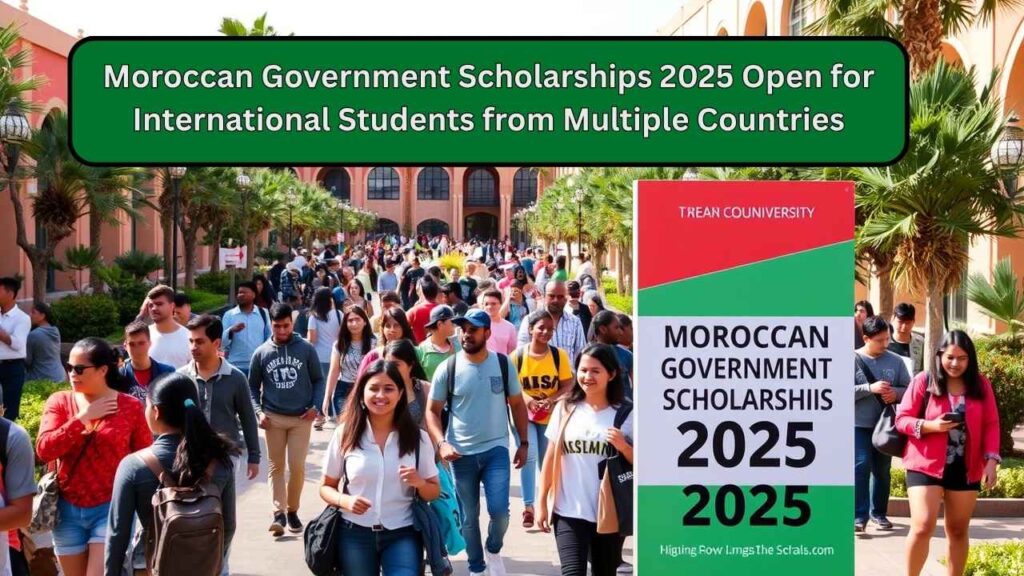Are you an aspiring scholar dreaming of a vibrant academic experience in a culturally rich setting? The Moroccan Government Scholarships 2025 offer an incredible opportunity for international students from multiple countries to pursue higher education in the captivating Kingdom of Morocco. As an expert scholarship advisor, I’m here to guide you through every step of this exciting process, ensuring you have all the comprehensive, actionable, and encouraging information you need to successfully navigate your application.
Morocco, a bridge between Europe and Africa, boasts a dynamic educational landscape, offering diverse programs taught in French and, increasingly, in English. These scholarships open doors not just to academic excellence but also to an immersive cultural adventure that promises to shape your worldview.

The Moroccan Government Scholarships 2025 present an unparalleled opportunity for international students to pursue their academic dreams in a truly unique and enriching environment. While the application process requires diligence and attention to detail, the rewards—a fully funded education, invaluable cultural immersion, and a global network—are immense.
Don’t let any perceived complexities deter you. Start preparing your application now, connect with your local nominating authority, and envision yourself thriving amidst the vibrant Moroccan landscape. This scholarship isn’t just about obtaining a degree; it’s about embarking on a transformative journey that will broaden your horizons and equip you for future success. Take this exciting step towards your academic future!
What are the Moroccan Government Scholarships?
The Moroccan Government Scholarships are prestigious, fully funded opportunities primarily offered through the Moroccan Agency for International Cooperation (AMCI) to students from partner countries across Africa, Asia, and South America. These scholarships are a testament to Morocco’s commitment to international cooperation and education, fostering strong ties and contributing to global knowledge exchange.
The scholarships cover various levels of study, from undergraduate degrees to master’s and PhD programs, as well as vocational training. They aim to attract talented individuals who are keen to contribute to their home countries’ development upon graduation.
Eligibility Criteria for Moroccan Government Scholarships?
Meeting the eligibility criteria is the crucial first step. While specific requirements can vary slightly depending on your home country and the program of study, here’s a general overview of what you’ll typically need:
- Nationality: You must be a citizen of a country that has a bilateral cooperation agreement with Morocco for these scholarships. Your country’s Ministry of Education or equivalent body will usually be the primary point of contact for these opportunities.
- Age Limits:
- Undergraduate Studies: Generally, applicants should be between 19 and 23 years of age.
- Master’s Studies: Typically, applicants should not be above 35 years old.
- PhD Studies: The age limit is usually around 45 years.
- Academic Qualifications:
- Undergraduate: A high school diploma or its equivalent, often with specific grade requirements (e.g., “Very Good,” “Good,” or “Fairly Good” mentions for the Baccalaureate).
- Master’s: A relevant Bachelor’s degree from a recognized university, with at least a “Good” mention.
- PhD: A Master’s degree or an equivalent higher education diploma relevant to your desired field, along with a detailed research proposal.
- Language Proficiency: French is the primary language of instruction in most Moroccan public institutions. Non-French speakers will typically be required to undergo a one-year French language training program in Rabat before commencing their main studies. Some programs might also be offered in English, for which IELTS or TOEFL scores would be necessary.
- Health and Character: Applicants generally need to provide a medical certificate attesting to their physical and mental fitness, and a police clearance certificate from their home country.
Benefits of the Moroccan Government Scholarships?
The Moroccan Government Scholarships are designed to be comprehensive, ensuring that recipients can focus on their studies without undue financial burden. The benefits typically include:
- Financial Stipend: A monthly stipend, often around 1,750 Moroccan Dirhams (approximately US$175), is provided to cover living expenses. While this might seem modest, Morocco offers a relatively affordable cost of living.
- Tuition Fee Coverage: All tuition fees at public universities and training institutes are fully covered by the scholarship.
- Airfare: A one-way ticket upon arrival in Morocco and a return ticket after graduation are often provided.
- Accommodation: Accommodation is typically arranged through university partnerships, or assistance is provided in finding suitable housing options, such as university dormitories or private rentals.
- Health Insurance: Comprehensive health insurance coverage for medical needs is usually part of the scholarship package.
- Language Training: For non-French speakers, a compulsory one-year French language course in Rabat is included to ensure smooth integration into the academic environment.
Application Process Step-by-Step
Applying for the Moroccan Government Scholarship requires careful attention to detail and adherence to specific protocols. Here’s a step-by-step guide:
- Identify Your Nominating Body: The Moroccan Government Scholarships are generally coordinated through government-to-government agreements. Your first step is to contact the Ministry of Education or a similar scholarship-administering body in your home country. They will be responsible for the initial pre-selection and nomination process.
- Gather Information and Announcements: Stay vigilant for official announcements from your country’s nominating body. These announcements will contain crucial information about deadlines, specific requirements for your nationality, and the application portal. In my experience advising students, missing these local announcements is one common hurdle.
- Prepare Required Documents: Begin collecting and preparing all necessary documents well in advance. This is a critical step that often takes time.
- Pre-registration (Online Platform): Your country’s nominating authority will typically be provided with access codes to a digital platform managed by AMCI. They will enter your application details and documents here. The pre-selection of candidates is often based on academic grades from the final year of your previous studies. The deadline for this pre-registration phase is typically around June 15th for the upcoming academic year.
- Nomination by Your Home Country: If you are pre-selected, your local government agency will officially nominate you for the scholarship.
- Final Confirmation Phase: After the announcement of final academic results (e.g., Baccalaureate results), a second confirmation phase takes place. This leads to the final lists of selected candidates. The deadline for receiving these results is generally around July 31st.
- Receive Admission Letter: If your application is successful, you will receive a pre-admission letter outlining the next steps for registration in Morocco.
- Visa Application: Once you have your admission letter, you can apply for a student visa at the Moroccan Embassy or Consulate in your country. Ensure you have all required documents, including proof of funds (though the scholarship covers most expenses, it’s good to be prepared), and accommodation confirmation.

Required Documents Checklist
While the exact list might vary, prepare the following documents, ensuring they are certified copies and translated into French or English if required:
- Completed Scholarship Application Form: This will be provided by your nominating body.
- Certified Copies of Academic Transcripts and Diplomas: From all previous educational institutions.
- High School Diploma/Baccalaureate Certificate (for undergraduate applicants).
- Bachelor’s Degree Certificate and Transcripts (for Master’s applicants).
- Master’s Degree Certificate and Transcripts (for PhD1 applicants).
- Curriculum Vitae (CV): Detailing your academic and professional history.
- Motivation Letter/Personal Statement: A compelling essay explaining your academic goals, why you chose Morocco, and how the chosen program will benefit you and your home country.
- Research Proposal: (For PhD applicants) A detailed outline of your proposed research.
- Passport Copy: Biodata page, valid for at least one year beyond your intended study period.
- Birth Certificate: Certified copy.
- Passport-Sized Photographs: Recent, color photos with your full name and nationality written on the back.
- Medical Certificate: Issued by public health services, attesting to your physical and mental fitness, and confirming vaccinations and absence of contagious diseases (especially tuberculosis).
- Police Record/Clearance Certificate: Recent and valid.
- Letters of Recommendation: From academic professors or supervisors.
Tips for a Successful Application
Securing a Moroccan Government Scholarship is competitive, but with the right approach, you can significantly enhance your chances. Here’s what I’ve seen many successful applicants focus on:
- Start Early: The application process is multi-layered, involving your home country’s authorities and the Moroccan side. Give yourself ample time to gather documents, complete forms, and meet deadlines.
- Craft a Compelling Motivation Letter: This is your chance to shine beyond your academic records. Clearly articulate your academic and career aspirations, demonstrating how studying in Morocco aligns with your goals. Highlight your interest in Moroccan culture and how you envision contributing to your home country after your studies.
- Secure Strong Recommendation Letters: Choose recommenders who know you well academically and can speak to your strengths, potential, and character. Provide them with your CV, motivation letter, and details about the scholarship to help them write a tailored and impactful letter.
- Ensure Document Accuracy and Completeness: Double-check every document for accuracy. Any discrepancies or missing information can lead to your application being rejected. Ensure all translations are official and certified.

Life as a Scholarship Holder in Morocco
Life as a scholarship holder in Morocco is an enriching experience that extends beyond academics. You’ll be immersed in a captivating country with a vibrant culture, stunning landscapes, and warm hospitality.
- Cultural Immersion: Morocco offers a unique blend of Arab, Berber, and African influences. From the bustling souks of Marrakech to the ancient Fes Medina and the modern Casablanca, you’ll have endless opportunities to explore. Engaging with locals, trying traditional cuisine, and participating in cultural events will be part of your daily life.
- Academic Environment: Moroccan universities are increasingly focused on global standards and research. While French is predominant, the academic environment is supportive, and many institutions are making efforts to welcome international students.
- Cost of Living: Compared to many Western countries, the cost of living in Morocco is relatively affordable, making the scholarship stipend quite manageable for day-to-day expenses.
- Travel Opportunities: Being in Morocco places you at a crossroads, allowing for easy exploration of different regions of Morocco itself, and potentially neighboring countries in North Africa or even Europe, depending on visa requirements.
A Glimpse into Student Life in Morocco.
FAQ
What is the primary language of instruction in Moroccan universities for scholarship holders?
French is the primary language of instruction in most public universities. Non-French speakers will typically undergo a one-year French language training program in Rabat.
Is the Moroccan Government Scholarship fully funded?
Yes, the scholarship is generally fully funded, covering tuition fees, a monthly stipend, accommodation, health insurance, and often international airfare.
How do I apply for the Moroccan Government Scholarship from my country?
The application process is usually coordinated through your home country’s Ministry of Education or a similar government body. You will apply through them, and they will nominate eligible candidates to the Moroccan authorities (AMCI).










